Anthony Rose is one of the most recognizable names in Toronto’s culinary scene — not because he seeks the spotlight, but because his iconic menus and brand of quirkiness have etched him into the city’s food tapestry. Some of his peers collect restaurants like chess pieces, but decades into his career, the laid-back chef-owner admits that his focus is quite the reverse.
“I’m definitely trying to do less; I’m trying to have less,” says Rose, dressed in a tie-dyed t-shirt and beanie hat. “I’m trying to concentrate more on Fat Pasha and Schmaltz Appetizing, and just go back to my roots.”
It’s a striking turn for a chef who first made it onto the city’s radar at The Drake Hotel, where six years as executive chef honed his knack for upscale home cooking. With his foundation established, he opened Rose and Sons on Dupont, where a steady stream of brunch-obsessed diners lined up for the Jewish deli’s chopped liver and pastrami. Over the next few years, he rapidly built a mini-empire: Big Crow, a barbecue joint tucked behind Rose and Sons; Fet Zun, focused on modern Israeli flavours; and Fat Pasha, a tribute to modern Middle Eastern cuisine.
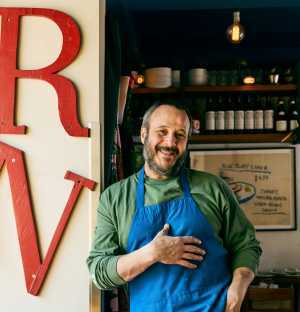
Anthony Rose, chef-owner of Fat Pasha
Carmen Cheung
Opened in 2014, Fat Pasha has always felt like the truest expression of Rose’s bold personality, with its rich tahini-heavy sauces and full-on flavours. Yet, its origin story had a surprising source: his landlord.
“Aman [Patel] was a big fan of the restaurants,” explains Rose. After having the Indian Rice Factory in the family for over 40 years, the landlord and lawyer by trade was keen for someone to take the space off his hands. “We said yes, immediately. It was a cool corner spot, with this great patio, and a little nanny house attached to it. But we had no idea what we were going to do here.”
That summer, Yotam Ottolenghi had just released his now-iconic Jerusalem cookbook. Rose had a brainwave for the concept and phoned his business partner Robert Wilder. “There were many Middle Eastern restaurants in the city, but no one had really done new Israeli or Jewish food,” says Rose. “It was far away from the fattiness of Big Crow and the over-the-top style of Rose and Sons.”
Initially, the concept leaned heavily into Middle Eastern flavours, but Rose made a game-time decision to shift course. “I grew up Ashkenazi, and all this food was [part of] Sephardic [culture]. I’d eaten some of that as a kid — hummus, falafel, shawarma — but I wasn’t familiar with it. I know my mom’s cooking better, so I meshed the two together.”
Though he credits mentors like Jean-Georges Vongerichten, Julia Child and his former boss Jonathan Waxman for helping to shape his culinary ethos, it’s still a trip to see his own dishes mimicked by other chefs. “That roasted cauliflower got stupid famous. You saw versions of it all over the world.”
Rose has never been proprietary about his creations: “Some people are very precious about their recipes — I don’t give a shit,” he says. However, Rose is quick to credit Miznon in Paris for inspiring the now-famous cauliflower. “I’ll take credit for putting the junk on the cauliflower. But I’ll give credit to [head chef] Eyal Shani for doing it in the first place.”
In 2022, Rose announced the closures of Rose and Sons and Big Crow in a vulnerable — and hilarious — Instagram post. He joked he had politely turned down Michelin stars, but there’s no mistaking the sting. “Rose and Sons: I miss the shit out of that place. I’d love to bring it back. I think it was a perfect restaurant.”
Fet Zun followed suit, closing in 2024. Today, only Fat Pasha and Schmaltz Appetizing — a counter-style spot for bagels, smoked fish and Jewish deli staples — remain. The idea of a fallow period is a tough pill to swallow for a chef known for unearthing trends and feeding diners dishes they never knew they needed. Still, Rose is confident that the city’s dining scene is in safe hands.
“Toronto is so fucking cool,” he says. For now, he’s happy to lean into his pared-down vision. “I don’t need eight or nine restaurants. I just need a couple of things to work really well, that I’m extremely passionate about.”
Famous Whole Roasted Cauliflower
Carmen Cheung
“The first time I ate a whole roasted cauliflower was at Mizon in Paris, in Le Marais. The cauliflower they served were these nice little balls, over-roasted, falling apart. All they had was salt, pepper, olive oil and, on the side, you could add some tahini. When I was making the dish, as simple and beautiful as it was, it’s just my style to put junk on it. We hard-boiled the cauliflower, then roasted it and stuffed it with halloumi. We were working on all these condiments, and I thought ‘My God, let’s put them all on there.’ It was instantly a hit. It’s funny, because it was right at the beginning when [the term] Instagrammable was shooting off … but it was all natural, by accident — and, it’s really, really good.
“Eight years ago, there was a cauliflower shortage … so I took it off the menu because I didn’t want to charge these [inflated] numbers for it. I got a huge amount of backlash. We put it back on the menu as ‘market price’, which was crazy for a vegetable. So, we started charging $38–40 for it. And it never stopped selling.”
The Chub Chub Sandwich
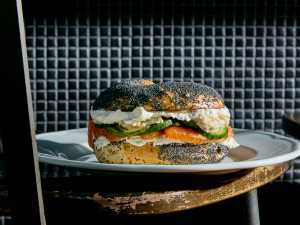
Carmen Cheung
“The Chub Chub was named after my niece. That was her nickname, not because she was chubby, or anything like that. It’s actually the most famous bagel at Schmaltz [Appetizing], and we sell it at Fat Pasha for brunch as well. One of our biggest sellers is the smoked white fish salad, so we combined that with the dill cukes, also one of our bestsellers. Plus, there’s lemon dill gravlax and horseradish cream cheese. It’s just packed with the hits.”
Fat Salatim Platter
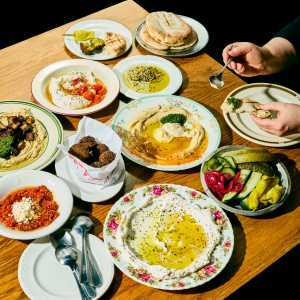
Carmen Cheung
“There’s this restaurant in Jaffa [Tel-Aviv] called The Old Man and the Sea. It’s not particularly good; it’s a tourist place, but you sit down and they bring 20 of these little dishes to the table and every single one of them is part of the meal. You’re buying into that whole thing, so I wanted to do something like that, just fit as many dishes in as I could. I think the ones that haven’t changed, other than some ingredients here and there, are the baba ghanoush, the garlic labneh, the hummus, the tahini and the pickles.
“Then there are other things that come and go: The whipped feta with honey, the chopped salad. About 75 per cent is written in stone and we’ll play with the rest. Ten years on, we’re still trying to make it bigger. We’re playing with adding a couple more layers: latkes with all the fixings, halloumi sticks and shakshuka dipping sauce. That’s where that creative energy goes.”
Linda’s Sweet Onion Brisket
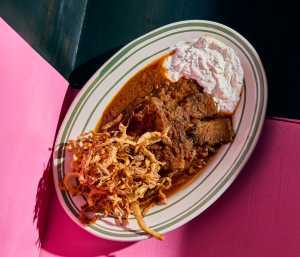
Carmen Cheung
“Linda is my mom, and as far back as I can remember, this brisket has been her staple. It goes on and off the menu. Every time we have a new crew here, she’ll come into Fat Pasha and make it from scratch. [Chefs] are like, ‘How much does this weigh?’ Whereas, a home cook, a bubbe, just throws a bunch of shit together, kind-of, sort-of following a recipe. We’ve perfected it for Fat Pasha. It comes with sweet onion gravy and crispy fried onions.”
Fried Crushed Potatoes
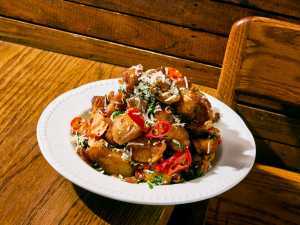
Carmen Cheung
“This was one of the original dishes. The potatoes are like candy. We take these Yukon Golds and we boil them, cool them, crush them and fry them almost too much. Then we toss them heavily with that chili and garlic, the oil, the herbs and the smoked paprika. It’s very, very moreish. You can eat too many of them extremely quickly. I used to try to give people another [healthier] version of that — but no one wanted it. It’s nice to have rich vegetables and rich dips. The potatoes are probably one of my favorite things on the menu; I can eat them with anything. But they’re definitely very rich.”
